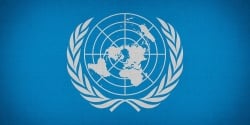Published: 14.04.2021

The United Nations intend to announce yet another ideological document drawn up following consultation burdened with significant manipulation. During the 47th Session of the UN Human Rights Council, a report will be presented, prepared by the UN Independent Expert on violence and discrimination based on sexual orientation and gender identity, Victor Madrigal-Borloz. The aim of the report is to promote “feminist thinking” and assess alleged threats for human rights resulting from “gender norms and structures”. Prior to the publication of the report, the UN invited for consultations, however biased towards a predetermined thesis. The Ordo Iuris Institute submitted its remarks to the report.
Ideological goals of the report
As stated in the description of the questionnaire posted on the website of the United Nations Human Rights Office of the High Commissioner, where a call for opinions and views for a report was announced:
“The report aims at further reinforcing feminist thinking (…).” Its goal is to discuss how “gender norms and structures relate to human rights violations against LGBT persons.”
The document “will also consider the role of gender in international law and State practice in light of the current backlash around the world against rights related to gender, sexuality and identity.” Hence, the aim of the report is to promote the gender ideology, to deny the natural division into two sexes, and most of all to stigmatise the states that object to the ideological approach to femininity and masculinity and the attempts at eradicating tradition and culture in favour of far-left ideas.
Although the aim of the report has been clearly stated, there was still hope to de-ideologise it with the possibility to submit an opinion by any interested party. The Ordo Iuris Institute and a number of other organisations defending the natural social order and fundamental human rights jumped at the opportunity. It might have been due to too many balanced and matter-of-fact opinions submitted to the UN that at the last minute it was decided to extend the deadline for submitting opinions.
However, most notable is the questionnaire that the “Independent Expert” prepared to be completed by those who intended to express their opinion on the report. The questions were asked in a way that leaves no doubt as to the authors’ intentions: anyone who as much as distrusts the gender ideology is an opponent of human rights and gender equality, and their beliefs must stem from tradition or culture and have been influenced by religion.
Even the question about sexual education contains the word “comprehensive”. Yes, Polish schools teach sexual education in a comprehensive manner in the form of Family Life Education (FLE), which presents all the relevant biology-based knowledge. Nevertheless, in point “b” of the said question, the Expert elucidates: “if not, are there efforts deployed by the State to establish and promote comprehensive sexual education, which incorporates diverse sexual orientation and gender identity perspectives?” Now we know that in order to give the “correct” answer, we should say that in Poland there is no “comprehensive sexual education”, because there is no mention of an ideological or gender-based approach to sexes and no vulgar education. The fact that the content of FLE classes includes physiological aspects of human sexuality and is as extensive as the content of other, often controversial sexual education curricula (such as the WHO sexual education standards), seems irrelevant considering the wording of the question. Meanwhile, all indicators (among others, the teen pregnancy rate, STD incidence) point to the greater effectiveness of Polish type A sexual education rather than Western type C education (according to WHO standards). In 2020, the Ordo Iuris Experts published a report on the inefficiency of sexual education proposed by WHO.
The gender model is ineffective in combatting violence
Next, the UN Expert asks for examples of using “the concept of gender (…) in religious narratives or narratives of tradition, traditional values or protection of the family to hinder the adoption of legislative or policy measures aimed at addressing or eradicating violence and discrimination based on sex, gender, sexual orientation and gender identity.” Such a question obviously indicates that the advocates of the gender ideology deny any possibility of a matter-of-fact argument and, even in the face of objective data pointing to the inefficiency of the gender perspective, they perceive any objection as negative and harmful. Meanwhile, statistics show that e.g. the idea of gender-based violence, which is the foundation of the Istanbul Convention, is not an effective solution to the problem of violence, and is even counterproductive. An FRA (Fundamental Rights Agency) survey conducted in 2014[1] showed that in the states where the gender perspective had long influenced the paradigm of combatting violence against women and domestic violence, it is not as efficient as expected. The survey shows that such states as Sweden, Finland or Denmark report the highest rates of women affected by violence (46% in Sweden, 47% in Finland and 52% in Denmark). This allows for the formulation of a thesis that the Istanbul Convention erroneously identifies the causes of violence against women, and that the actions taken to implement structural social and cultural changes will not achieve the expected results. The trend is different in the states that distant themselves from the gender perspective, such as Poland, where the rate of women affected by violence was 19%. Similarly, data shows that the gender perspective is not necessary to provide women with the possibility of holding managerial positions. The latest Eurostat data (Q3 of 2020) shows that in the EU countries, Lithuania and Poland report the highest number of women in managerial positions – 45% in Lithuania, and 44% in Poland. They were followed, among others, by Bulgaria and Hungary (42%). All of these countries are united by their opposition to the gender perspective. In the Netherlands, Germany or France, where the gender perspective is implemented in a number of fields, the rates of women in managerial positions were 26%, 31% and 36%, respectively.
In Poland a number of environments bring up the harmfulness and non-scientific character of “the concept of gender”. They point to the negative consequences of introducing this theory into culture and to undermining the identity of the family, marriage and even the mere existence of the sexes, thus disrupting the foundations of the legal order based on – it would seem – basic issues such as the existence of the sexes (woman and man), the fact that the mother is female, and the fact that marriage is a union between a woman and a man.
The absence of consent to “the adoption of legislative or policy measures aimed at addressing or eradicating violence and discrimination based on sex, gender, sexual orientation and gender identity” is also not unfounded and cannot – contrary to the belief of the authors of the questionnaire – be viewed as a symptom of backwardness or hatred resulting from religion or tradition. Such objection is due to the fact that human rights – including non-discrimination – are universal and belong to everyone, regardless of their particular characteristics. Granting additional special rights based on e.g. sexual identity does not lead to equality but discrimination of the others who are not members of that privileged group. This results in the escalation of the sense of injury and injustice, depending on the condition of discrimination, and in this way, actually leads to discrimination.
Biased questions
The questionnaire also contains a question on the initiatives taken by States in connection with the right to freedom of religion, belief or conscience that can have the practical impact of limiting the enjoyment of “sexual and reproductive rights”. First of all, the wording of this question is manipulative and has never been approved by international society. The term “sexual and reproductive rights” (SRR) or “sexual and reproductive health and rights” (SRHR) is not included in any binding treaty and does not even have a definition, and a number of states voice their objection to its use. The term is promoted by international organisations, which use it in making demands in an unlawful way, among others, to introduce universal acceptance of abortion, vulgar sexual education or promote the gender theory.
The question also contains an idea that the functioning of the right to conscientious objection (in practice, among others, the conscience clause) is a harmful solution leading to the deprivation of fundamental rights. Meanwhile, the right to conscientious objection is an integral and essential part of the freedom of conscience that is guaranteed both in the Polish Constitution and in international agreements, in particular the International Covenant on Civil and Political Rights (Article 18) and the European Convention on Human Rights (Article 9). The mere denial of this right is reprehensible and violates the aforementioned acts of international law. The efforts at legally obliging healthcare personnel to act against their conscience is a complete misrepresentation of this right.
Victor Madrigal-Borloz also directly asks for the identification of NGOs that oppose the gender ideology and those that promote it. The following question is also structured in a way that if answered “yes, I oppose the gender ideology”, it automatically labels you as someone who wants to deprive “LGBT individuals” of human rights:
“Who are the main actors who argue that the defenders of human rights of LGBT individuals are furthering a so-called ‘gender ideology’”? What are their main arguments? Have they been effective in regressing the human rights of LGBT individuals? Have their strategies (…) also impacted on the human rights of women and girls?”, asks the “Independent Expert”.
The reply of Ordo Iuris
In response to this question, we provided detailed information on the absence of systemic discrimination of anyone in Poland, on the activities of the Ordo Iuris Institute for human and women’s rights, we quoted data (the Fundamental Rights Agency survey) that clearly indicates that the Polish society is one of the most tolerant in the entire EU, and explained that there is no “right to abortion” in the Polish or international legal order, and abortion as such is one of the most cruel examples of discrimination based on, among others, sex or health. The way the question is formulated, however, means that the mere fact of answering results in the “labelling” of the Institute as an organisation that intends to limit human rights, whereas in fact, from the very beginning of its activity, Ordo Iuris has been working for and defending human rights.
The example of how the report on the protection from violence and discrimination based on sexual orientation and gender identity is drawn up, the wording of the questionnaire, the way the questions are manipulated, and the way answers are collected – all of these should be taken into account when choosing to read studies, analyses, reports or other texts published by the UN Human Rights Council.
Anna Kubacka - analyst of Ordo Iuris Legislative Center

24.04.2024
Mysterious links, the Kremlin, Catholic fundamentalism – Polish pro-abortion activist Klementyna Suchanow continues her crusade against her country’s main pro-family, anti-abortion lawyers’ organization, the Ordo Iuris Institute.

· The European Parliament adopted a resolution calling for the inclusion of the so-called right to abortion in the Charter of Fundamental Rights of the European Union.

· The anti-life projects proposed by our ruling coalition are only the beginning of a political process leading to the normalisation of the mass killing of unborn children.
· The French law of 1974, which was only supposed to open the floodgates to prenatal killing for women in distress, in fact established a new legal foundation through which almost a quarter of a million children lose their lives in France every year.